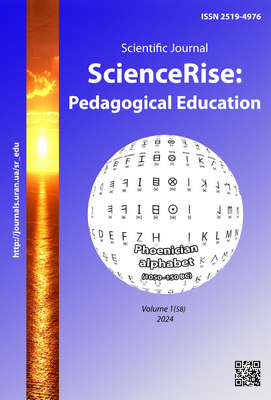Аналіз специфіки педагогічної підготовки кадрів для сектору безпеки
DOI:
https://doi.org/10.15587/2519-4984.2024.298501Ключові слова:
сектор безпеки, педагогічна підготовка, симуляційні центри, кадри, правозахистАнотація
Стаття присвячена огляду та аналізу специфіки педагогічної підготовки кадрів для сектору безпеки. Автори наголошують на необхідності пам'ятати, що в Україні педагогічна підготовка кадрів для сектору безпеки визначається специфічними потребами цього сектору та розрахована на забезпечення ефективної діяльності професіоналів у галузі безпеки. Розглянуто ключові аспекти, які обумовлюють педагогічну підготовку кадрів для сектору безпеки та оборони. Стаття також акцентує увагу на необхідності розуміння того факту, що сучасна педагогічна програма для сектору безпеки має інтегрований підхід, що об'єднує теоретичні знання та практичні навички. Крім того, вона звертає увагу на необхідність міждисциплінарного підходу, що дозволяє слухачам і курсантам розглядати проблеми безпеки з різних точок зору, включаючи соціальний, економічний та політичний аспекти. Автори нагадують про важливість врахування численних тенденцій, які враховують сучасні виклики та потреби сфери безпеки, у процесі педагогічної підготовки кадрів для сектору безпеки. У статті наведено основні аспекти, що висвітлюють тенденції педагогічної підготовки кадрів для сектору безпеки. У статті наголошується про факт глобалізації, який потребує збалансованого підходу до вивчення міжнародних аспектів безпеки та співпраці між державами. Наголошується на необхідності створення симуляційних центрів, які дозволяють слухачам і курсантам навчатися в реальних умовах, відтворюючи ситуації, що можуть виникнути у сфері безпеки. У статті відображені основні аспекти, які відображають специфіку педагогічної підготовки кадрів для сектору безпеки. Акцент у статті робиться на необхідності вивчення етичних аспектів та правозахисту в секторі безпеки. Практичне значення даної статті виявляється у можливості формування рекомендацій керівництву освітніх закладів щодо педагогічної підготовки кадрів для сектору безпеки
Посилання
- Sokolovskyi, S. A., Naumenko, M. A. (2020). Competency-based approach as a methodological basis for improving officers training of the National Guard of Ukraine. Asia Life Sciences, 22 (2), 455–468.
- Al’boschiy, O., Dorokhov, O., Hrabovskyi, Y., Naumenko, M. (2022). Automated balancing method of vector Illustration and its software implementation. Bulletin of the Transilvania University of Brasov. Series III: Mathematics and Computer Science, 2 (1), 177–192. https://doi.org/10.31926/but.mif.2022.2.64.1.12
- Hrabovskyi, Y., Babenko, V., Al’boschiy, O., Gerasimenko, V. (2020). Development of a Technology for Automation of Work with Sources of Information on the Internet. WSEAS transactions on business and economics, 17 (25), 231–240. https://doi.org/10.37394/23207.2020.17.25
- Naumenko, M., Tovma, L., Morozov, I. (2021). Management of material-technical supply of territorially distributed structures: logistic approach. Financial and Credit Activity Problems of Theory and Practice, 2 (33), 324–334. https://doi.org/10.18371/fcaptp.v2i33.206972
- Naumenko, M., Hrabovskyi, Y. (2018). Elaboration of methodology for designing a publishing and printing web portal. Eastern-European Journal of Enterprise Technologies, 2 (2 (92)), 14–22. https://doi.org/10.15587/1729-4061.2018.126305
- Gerasimenko, V. (2022). Methods of financial control economic activity of military units of the National Guard of Ukraine. Efektyvna Ekonomika, 2. https://doi.org/10.32702/2307-2105-2022.2.94
- Herasymenko, V. M. (2023). Metodyka planuvannia finansovoho kontroliu pry orhanizatsii zakupivel tovariv, robit ta posluh dlia viiskovykh chastyn Natsionalnoi Hvardii Ukrainy. Efektyvna ekonomika, 2.
- Gerasimenko, V. (2021). Methods of construction logistics structure of the organization. Pryazovskyi Economic Herald, 1 (24), 69–72. https://doi.org/10.32840/2522-4263/2021-1-11
- Pushkar, O., Hrabovskyi, Y. (2023). Development of an information model of personnel development in the process of training at the workplace. Scientific Bulletin of Mukachevo State University Series “Pedagogy and Psychology,” 9 (3), 63–71. Internet Archive. https://doi.org/10.52534/msu-pp3.2023.63
- Pushkar, O. I., Hrabovskyi, Y. M. (2020). Methodology of knowledge transformation for e-learning systems in training publishing industry specialists. Information Technologies and Learning Tools, 77 (3), 186–204. https://doi.org/10.33407/itlt.v77i3.2820
- Sikström, P., Valentini, C., Sivunen, A., Kärkkäinen, T. (2022). How pedagogical agents communicate with students: A two-phase systematic review. Computers & Education, 188, 104564. https://doi.org/10.1016/j.compedu.2022.104564
- Cleovoulou, Y., Iznardo, M., Kamani, F. (2022). An examination of equity pedagogy during program coherence building in teacher education. Teaching and Teacher Education, 120, 103866. https://doi.org/10.1016/j.tate.2022.103866
##submission.downloads##
Опубліковано
Як цитувати
Номер
Розділ
Ліцензія
Авторське право (c) 2024 Olexander Cherkashin, Olena Kuruch

Ця робота ліцензується відповідно до Creative Commons Attribution 4.0 International License.
Наше видання використовує положення про авторські права Creative Commons CC BY для журналів відкритого доступу.
Автори, які публікуються у цьому журналі, погоджуються з наступними умовами:
1. Автори залишають за собою право на авторство своєї роботи та передають журналу право першої публікації цієї роботи на умовах ліцензії Creative Commons CC BY, котра дозволяє іншим особам вільно розповсюджувати опубліковану роботу з обов'язковим посиланням на авторів оригінальної роботи та першу публікацію роботи у цьому журналі.
2. Автори мають право укладати самостійні додаткові угоди щодо неексклюзивного розповсюдження роботи у тому вигляді, в якому вона була опублікована цим журналом (наприклад, розміщувати роботу в електронному сховищі установи або публікувати у складі монографії), за умови збереження посилання на першу публікацію роботи у цьому журналі.








